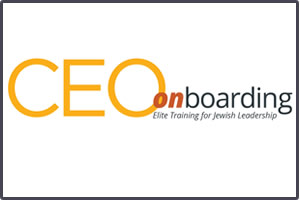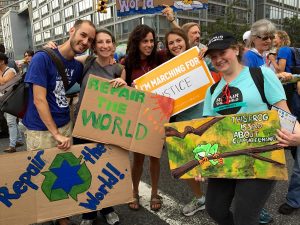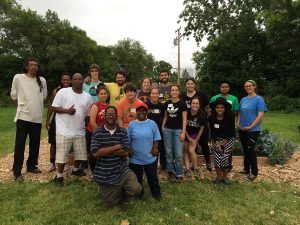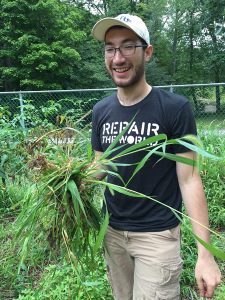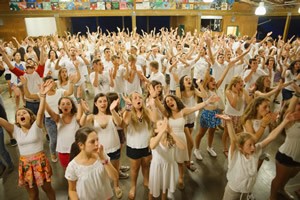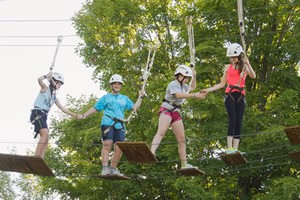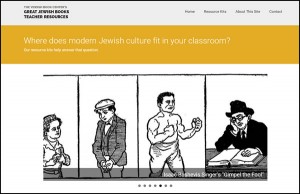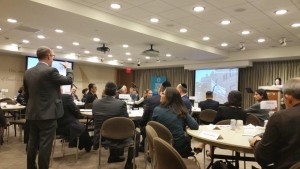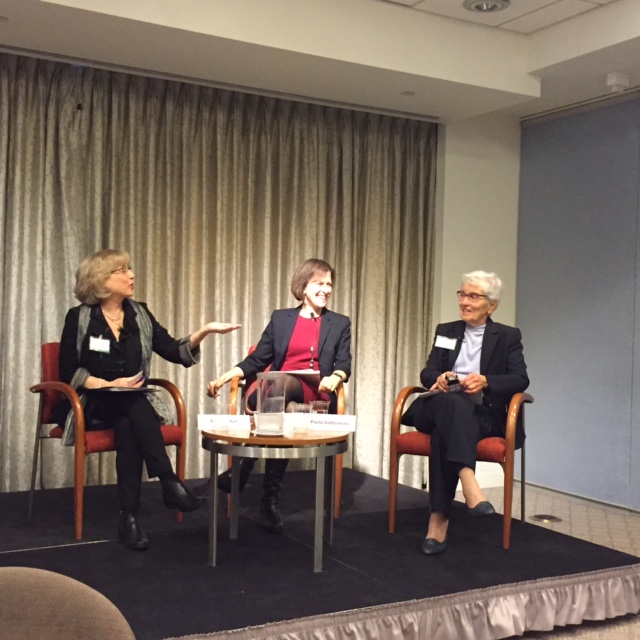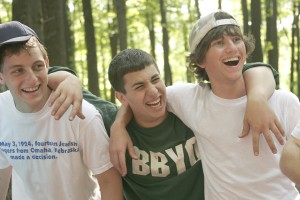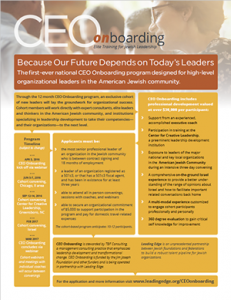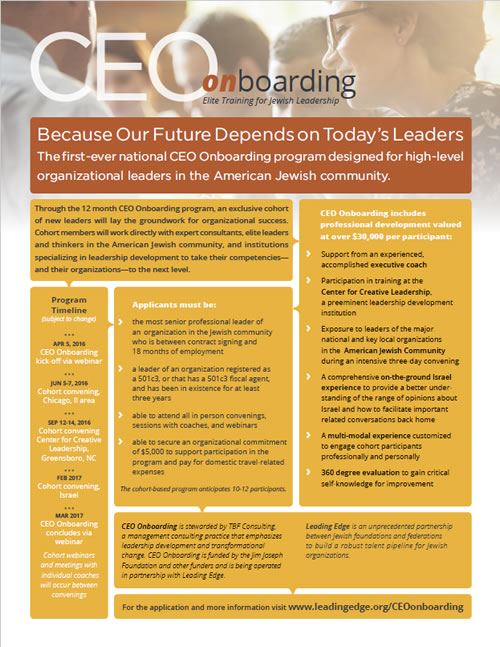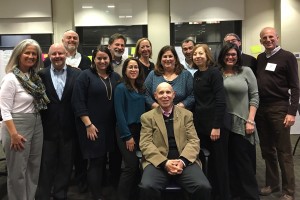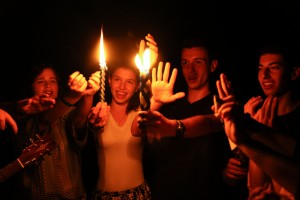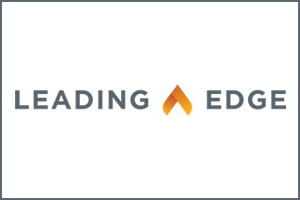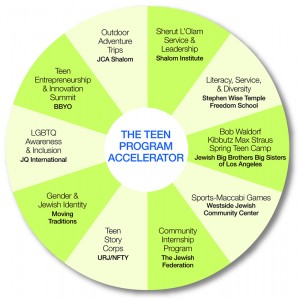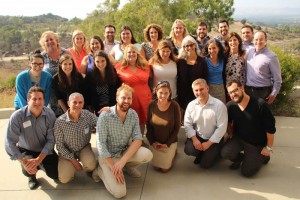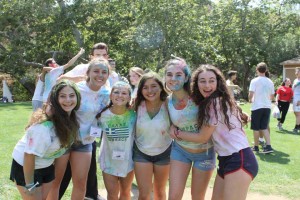Bonded by a shared passion for Jewish Outdoor, Food, and Environmental Education (JOFEE), more than 160 professionals from federations, JCCs, camps, independent Jewish organizations, and secular institutions, along with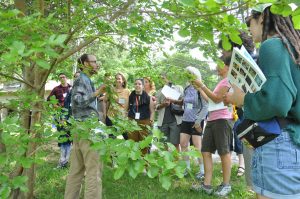
emerging leaders, funders, and many more community stakeholders, came together at Isabella Freedman Jewish Retreat Center earlier this month for the first-ever JOFEE Network Gathering.
Participants were welcomed by Hazon President & CEO Nigel Savage, conference organizer Julie Botnick, and Steven Green of the Jim Joseph Foundation and learned from each other and from leading educators who are pushing the boundaries of dynamic JOFEE programming, both inside and outside of the classroom. JOFEE Fellows—young, talented leaders receiving year-long training and placements at JCC’s and JOFEE organizations across the country—met one-on-one with mentors during the Gathering, which was the culmination for them of three weeks of intensive training. There was hands-on learning about topics from wild edibles to indigenous peoples to shechita; a visioning session where any participant could share thoughts on the future of JOFEE; and a moving presentation from 87-year-old Rabbi Everett Gendler on modern practices of counting the Omer (the Gendler family generously supports the Gendler Grapevine grants; many of the grantees were at the conference). In addition to stalwart organizations such as Hazon, Pearlstone Center, Urban Adamah, and Wilderness Torah, new ventures such as the Jewish Initiative for Animals were introduced to the broader community.
I felt that the most powerful component of the event was the fact that every interaction that I had was full of positivity and mindfulness. I was so impressed and inspired by the number of people who are together on this journey.
– Meg Mastroianni, JOFEE Network Gathering participant
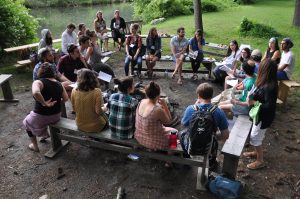 The 2014 report, Seeds of Opportunity: A National Study of Immersive JOFEE Education, demonstrated the growing demand for Jewish learning experiences grounded in the relationship between Jewish tradition and the natural world. The report showed that JOFEE programming breathes fresh life into Jewish organizations and fosters an emerging group of leaders and community members who may not have otherwise found connections to the broader Jewish community. As Jewish communities discover the power of JOFEE, the need for skilled leaders and educators increases as well.
The 2014 report, Seeds of Opportunity: A National Study of Immersive JOFEE Education, demonstrated the growing demand for Jewish learning experiences grounded in the relationship between Jewish tradition and the natural world. The report showed that JOFEE programming breathes fresh life into Jewish organizations and fosters an emerging group of leaders and community members who may not have otherwise found connections to the broader Jewish community. As Jewish communities discover the power of JOFEE, the need for skilled leaders and educators increases as well.
This gathering, along with JOFEE Fellowship, are the result of collaborative, cross-organizational efforts to create more professional pathways and to help communities deliver the highest-quality JOFEE programming. Participants left inspired about the growing interest and innovations in JOFEE, and with a commitment to each other to maintain ongoing and impactful relationships to strengthen their growing network.
The JOFEE Fellowship training program was one of the most phenomenal training experiences I have been a part of. I feel deeply fortunate to have spent the last three weeks learning, challenging myself, and deepening my connection to Judaism and the natural world — and even more fortunate to have spent this time in a supportive, passionate community of JOFEE educators… Before starting this training, I was unsure of how the program would go, or how committed I felt to the JOFEE world. After three weeks of a wonderfully planned, well-funded, and inspiring program, I can safely say that I have fallen in love with the JOFEE field and plan to stay in it for a long time. This work is essential to the modern Jewish community here in the U.S.
– Bailey Lininger, Tamarack JOFEE Fellow
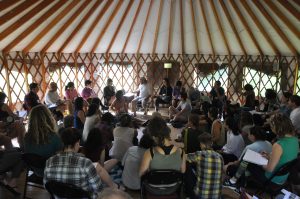
With an increasingly strong network, field leaders are poised to bring JOFEE to more participants and communities, and to support individuals, organizations, and institutions who care deeply about this vibrant form of Jewish life and learning.
The Jim Joseph Foundation has awarded multiple grants to support the research that led to the JOFEE report (Seeds of Opportunity: A National Study of Immersive Jewish Outdoor, Food, and Environmental Education (JOFEE) and to support the JOFEE Fellowship, including grants to Hazon, Pearlstone Center (MD), Urban Adamah, and Wilderness Torah (CA).

 The 2014 report, Seeds of Opportunity: A National Study of Immersive JOFEE Education, demonstrated the growing demand for Jewish learning experiences grounded in the relationship between Jewish tradition and the natural world. The report showed that JOFEE programming breathes fresh life into Jewish organizations and fosters an emerging group of leaders and community members who may not have otherwise found connections to the broader Jewish community. As Jewish communities discover the power of JOFEE, the need for skilled leaders and educators increases as well.
The 2014 report, Seeds of Opportunity: A National Study of Immersive JOFEE Education, demonstrated the growing demand for Jewish learning experiences grounded in the relationship between Jewish tradition and the natural world. The report showed that JOFEE programming breathes fresh life into Jewish organizations and fosters an emerging group of leaders and community members who may not have otherwise found connections to the broader Jewish community. As Jewish communities discover the power of JOFEE, the need for skilled leaders and educators increases as well.
